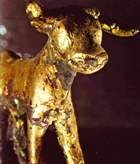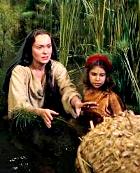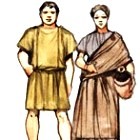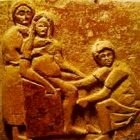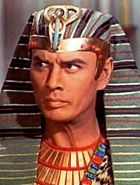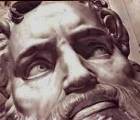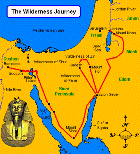Moses and God: the Bible story
Moses was not a natural leader or an obvious choice for the task ahead, but God chose him anyway. He spoke to Moses from a burning bush, telling Moses his name: I AM WHO AM.
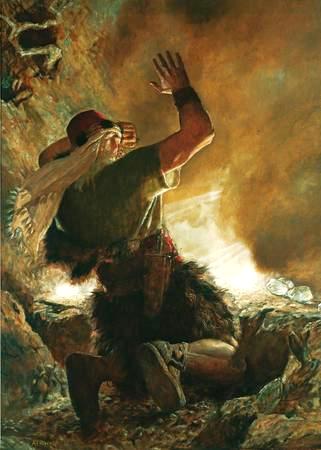
Moses and the Burning Bush, Arnold Friburg
God then commissioned Moses to confront Pharaoh and demand the release of all the Hebrew workers in Egypt. Moses was understandably dubious, but God insisted.
The story of Moses contains 6 episodes, of which this is the second:
- The baby Moses is cast adrift in the waters of the Nile: Exodus 2:1-10
- The Burning Bush, God tells Moses to save the Hebrews: Exodus 2:23-4
- Moses & Pharaoh, ‘Let My People Go’, 10 Plagues of Egypt: Exodus 5-12
- Wandering in the Desert, Crossing the Red Sea: Exodus 13-18
- The Ten Commandments: Exodus 20
- The Golden Calf: Exodus 32
Moses and Pharaoh
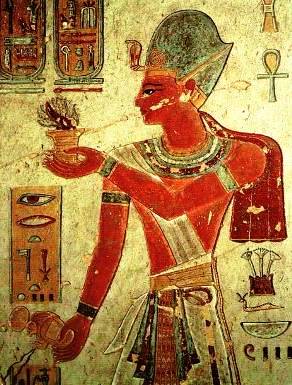
Egyptian wall painting of a Pharaoh, said to be Ramesses II
Scholars argue that the Pharaoh in the story of Moses may have been Ramesses II, shown at right in an Egyptian wall painting.
Moses grew up in the court of the Pharaoh. When he was old enough he left the palace. Once out in the real world he saw things he did not like, in particular a Hebrew worker being savagely beaten.
Moses was angry at what he saw, and in turn responded savagely. He killed the Egyptian and hid his body in the sand – but only after he had looked to see that no-one was watching.
Despite his caution, he had been seen. Pharaoh was told what had happened, and sought to punish him.
Moses knew he was in real danger so he fled, out into the desert, where he lived as a shepherd. He married and became a father; his father-in-law was the priest Jethro.
In the meantime, the Pharaoh whose daughter had once saved Moses had died, and been replaced by another ruler. We do not know if Moses, as a boy, had met this man, but the Bible emphasises the fact that a long time has passed since Moses was at court.
None of this worried Moses. He had a wife and sons, and seems settled into a predictable life.
Moses sees the Burning Bush
Moses was just a simple shepherd, but in the Bible ‘shepherd’, as well as being an occupation, is a code-word for ‘leader’:
- David was a shepherd, and
- Jesus was called the Good Shepherd.
So the Bible, when it introduces Moses as a shepherd, is already signalling that something special is in store for him.
Once, when looking after his flock, Moses let them wander further than usual. He came to Horeb, the holy mountain of God otherwise known as Mount Sinai.
As he was passing along he saw a bush that was burning brightly, but did not seem to be burning up as you would expect –
- later Jewish writers found in this a symbol for the Jewish nation as a whole.
- It is also worth noting that the Hebrew word for ‘bush’ seneh, suggests the name of the mountain, Sinai, where God first appeared (Deuteronomy 33:2).
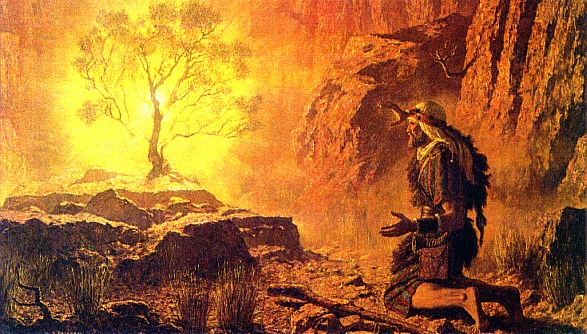
Moses shields his eyes from the blazing light of the Burning Bush
Moses knew he was in the presence of some extraordinary power. Then a voice or presence spoke to him, calling his name. Moses took his sandals off – this was clearly holy ground. Then the Presence identified itself: :”I am the God of your father, the God of Abraham, the God of Isaac, and the God of Jacob.”
Moses waited, and listened.
Then God declared his purpose: he had chosen Moses to lead the Hebrew people out of Egypt to a ‘good and broad land, a land flowing with milk and honey’. (Milk came from good pasture land capable of supporting flocks; honey came from agricultural land with plentiful crops.)
Moses listened, but was not entirely sure that he could do this. Not sure at all, in fact. Who was he to enter Pharaoh’s presence, let alone confront him and make demands?
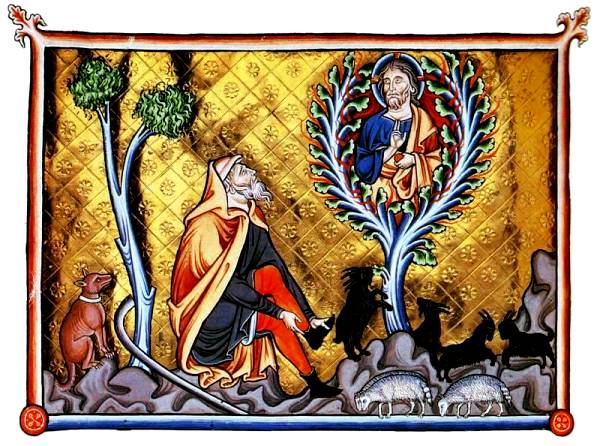
Moses sees God in the Burning Bush, medieval manuscript illumination
God reveals His Name to Moses
God reassured him, but Moses expressed another doubt. Why would the Hebrews take any notice of him, Moses, when he told them they had to leave Egypt? After all, Moses did not even know the name of this Being who spoke to him.
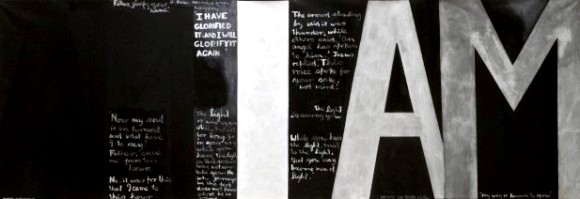
‘I Am’ painting by Colin McCahon
God then revealed his name, the majestic I AM WHO AM, or YHWH.
God’s revelation of his name was the central element of Moses’ call. The word seems to come from the Hebrew verb ‘hyh‘ and can be translated ‘he is’ or ‘he creates’. The verb ‘hyh‘ never refers to a static situation or event like a simple ‘to be’. This is a Being who is active in creation.
God then told Moses to call the elders of Israel together and tell them that God had appeared to him and told him to give them a message: that God had seen their plight in Egypt, and would deliver them into a land flowing with milk and honey. He reassured Moses, saying that the people would listen and believe.
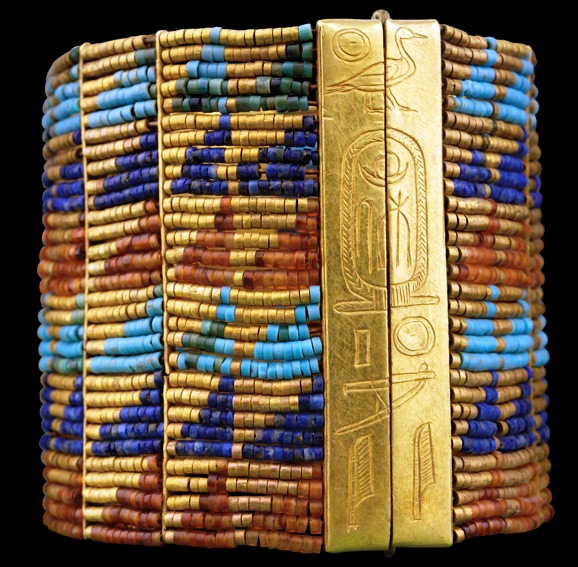 God said the Egyptians would let them go, even giving them gold and jewels to take – or if they did not, then the Hebrews should feel free to take goods as recompense for their long weary days of labor in Egypt.
God said the Egyptians would let them go, even giving them gold and jewels to take – or if they did not, then the Hebrews should feel free to take goods as recompense for their long weary days of labor in Egypt.
At right is a gold bracelet, decorated with cornelian and lapis lazuli, from the tomb of Queen Ahhotep, early 18th dynasty, about the same period as the story of Moses’ encounter with God.
This last suggestion, that the Hebrews may steal from the Egyptians, is glossed over or ignored in most commentaries.
Moses the Miracle Worker
But Moses was still unconvinced. He mentioned two things:
- his credibility among the Hebrews – he was after all an ordinary man, without power or influence
- his problematic speech – he was slow and halting, and some scholars have even suggested he may have stuttered.
In response, God shows him how to impress the impressionable Hebrews with trickery – turning a staff into a snake and producing an illusion of leprosy on the skin of his hand.
When the time came, Moses uses neither of these tricks. God also promises that, when the time came, Moses would be eloquent and persuasive.
Moses then returned home and asked permission of Jethro to carry out the task God has given him. Respect for the head of the family.
Then he took his wife and sons and set out on his terrifying mission to confront Pharaoh.
Moses’ story in brief
- God appears to Moses in the form of a burning bush that is not consumed by the fire.
- He commands a reluctant Moses to liberate the Hebrew people from their bondage in Egypt.
- Moses believes he is incapable of such a heroic act, but God reassures him.
- With God’s help, even the most unlikely things can happen.
Moses meets God
- Moses means ‘to draw or lift’, from the Hebrew word masha. It may also come from the Egyptian word mesu , pronounced ‘Mosheh’ by the Hebrews, which is connected with the Egyptian word for ‘child’ and appears in such names as Thut-moses, Ra-mses, etc. Or the name may simply mean ‘child of the water’.
- Jethro means prosperous, important.
- Pharaoh was the formal title of the ruler of Egypt. There are several Pharaohs in the Old Testament. The ruler in the story of the adult Moses is not named, but may have been Ramesses II.
- Aaron may mean ‘strong one’ or ‘source of strength’; it may also mean ‘mountain’.
Moses meets God
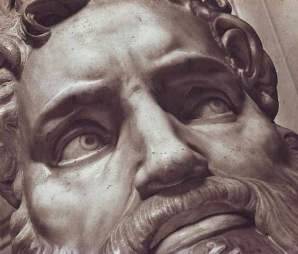 Moses means ‘to draw or lift’, from the Hebrew word masha. It may also come from the Egyptian word mesu , pronounced ‘Mosheh’ by the Hebrews, which is connected with the Egyptian word for ‘child’ and appears in such names as Thut-moses, Ra-mses, etc. Or the name may simply mean ‘child of the water’.
Moses means ‘to draw or lift’, from the Hebrew word masha. It may also come from the Egyptian word mesu , pronounced ‘Mosheh’ by the Hebrews, which is connected with the Egyptian word for ‘child’ and appears in such names as Thut-moses, Ra-mses, etc. Or the name may simply mean ‘child of the water’.- Jethro means prosperous, important.
- Pharaoh was the formal title of the ruler of Egypt. There are several Pharaohs in the Old Testament. The ruler in the story of the adult Moses is not named, but may have been Ramesses II.
- Aaron may mean ‘strong one’ or ‘source of strength’; it may also mean ‘mountain’.
Bible Text Exodus 3:1-15
Now Moses was tending the flock of Jethro his father-in-law, the priest of Midian, and he led the flock to the far side of the desert and came to Horeb, the mountain of God.
There the angel of the Lord appeared to him in flames of fire from within a bush. Moses saw that though the bush was on fire it did not burn up.
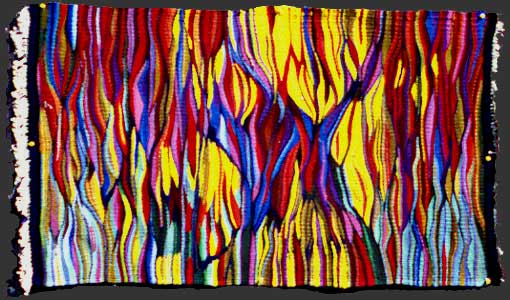
Burning Bush Tapestry, by E Thor Carlson
So Moses thought, “I will go over and see this strange sight—why the bush does not burn up.”
When the Lord saw that he had gone over to look, God called to him from within the bush, “Moses! Moses!” And Moses said, “Here I am.”
“Do not come any closer,” God said. “Take off your sandals, for the place where you are standing is holy ground.”
Then he said, “I am the God of your father, the God of Abraham, the God of Isaac and the God of Jacob.” At this, Moses hid his face, because he was afraid to look at God.
The Lord said, “I have indeed seen the misery of my people in Egypt. I have heard them crying out because of their slave drivers, and I am concerned about their suffering.
So I have come down to rescue them from the hand of the Egyptians and to bring them up out of that land into a good and spacious land, a land flowing with milk and honey—the home of the Canaanites, Hittites, Amorites, Perizzites, Hivites and Jebusites.
And now the cry of the Israelites has reached me, and I have seen the way the Egyptians are oppressing them.
So now, go. I am sending you to Pharaoh to bring my people the Israelites out of Egypt.”
But Moses said to God, “Who am I, that I should go to Pharaoh and bring the Israelites out of Egypt?”
And God said, “I will be with you. And this will be the sign to you that it is I who have sent you: When you have brought the people out of Egypt, you will worship God on this mountain.”
Moses said to God, “Suppose I go to the Israelites and say to them, ‘The God of your fathers has sent me to you,’ and they ask me, ‘What is his name?’ Then what shall I tell them?”
God said to Moses, “I am who I am . This is what you are to say to the Israelites: ‘I AM has sent me to you.’ ”
God also said to Moses, “Say to the Israelites, ‘The Lord, the God of your fathers—the God of Abraham, the God of Isaac and the God of Jacob—has sent me to you.’ This is my name forever, the name by which I am to be remembered from generation to generation.
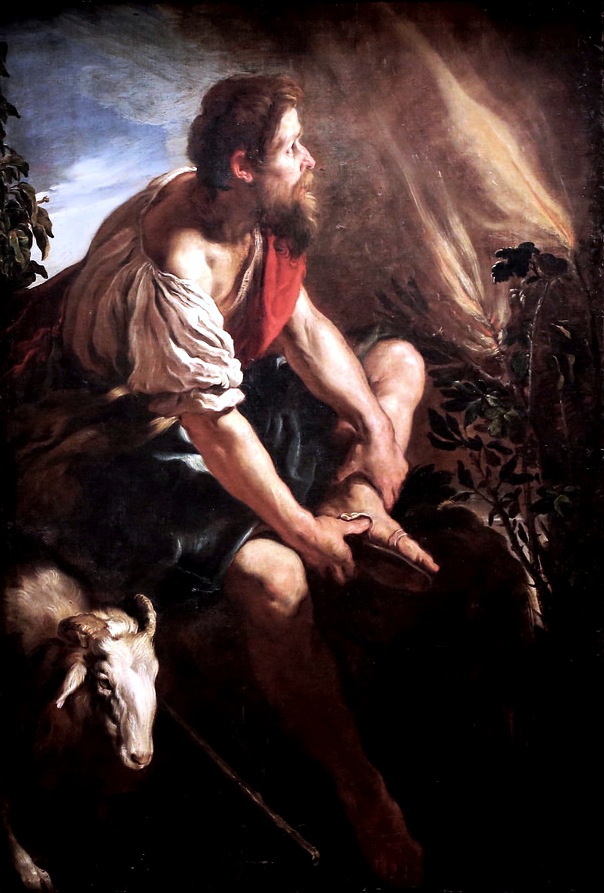
Moses at the Burning Bush, Domenico Fetti
Bible Study Activities for Moses’ story
Some Topics for Discussion or Meditation
1. Lack of faith in God
How many times have you doubted God? When you see evil things happening around you, or wonder why God allows something to happen…
Think of Moses:
- he had very few contacts that could be valuable to him
- he was not a clever speaker who could convince people of his worth
- he was not rich or powerful.
But he believed that God had a purpose for him.
God has a purpose for each of us. You may not understand what it is – Moses didn’t.
But try to listen for God’s voice, and pray for understanding and wisdom. It will come.
2. Lack of faith in yourself
- How many times have you doubted your own abilities?
- How many times has this held you back?
Of course it’s good to be realistic about yourself, but there’s a difference between realism and pessimism.
In your own quiet way you can be a hero too.
Search Box
![]()
Who was..?
© Copyright 2006
Elizabeth Fletcher



